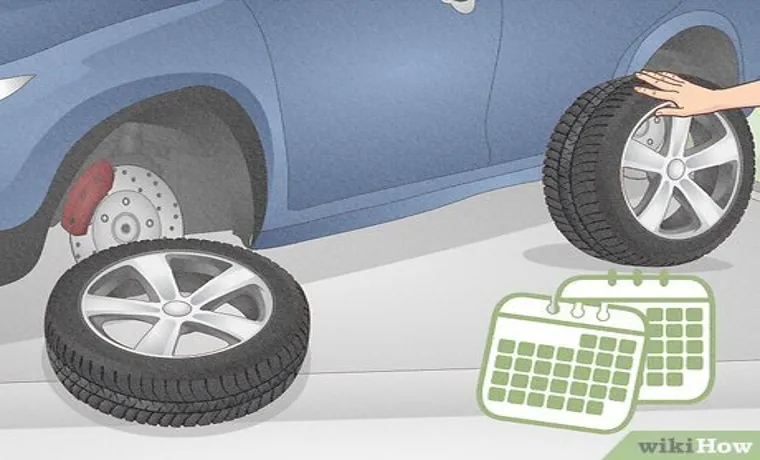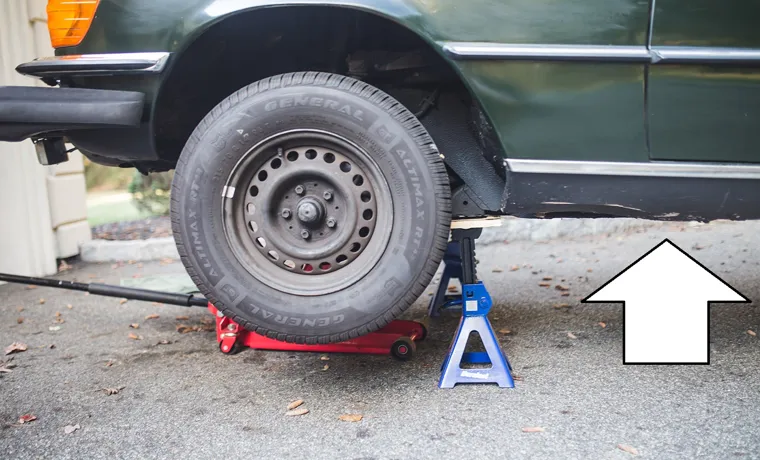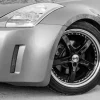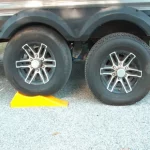Have you ever tried to jack up your car to change a tire, only to find that it won’t spin? It can be a frustrating experience, but understanding why your tire won’t spin can help you diagnose the issue and get back on the road in no time. One common reason for a tire not spinning when jacked up is a seized brake caliper. This means that the brake pads are stuck against the rotor, preventing the wheel from turning.
This could be caused by a variety of issues, such as a damaged brake line, worn brake pads, or a malfunctioning caliper. Another possibility is a stuck parking brake. If you accidentally left your parking brake engaged, it can prevent the wheel from turning even when jacked up.
In this case, simply disengaging the parking brake should resolve the issue. It’s also worth checking that the lug nuts are loosened before attempting to remove the wheel. If they are still tight, it can prevent the wheel from spin when jacked up.
In summary, there are several reasons why your tire may not be spinning when jacked up. By understanding the potential causes, you can troubleshoot the issue and get back on the road safely. Don’t let a frustrating tire change experience ruin your day – take the time to diagnose and fix the issue correctly.
Table of Contents
Possible causes
If you’ve found that your tire won’t spin when jacked up, there could be a few possible causes. One potential issue could be a frozen brake caliper. When this happens, the brake pads can become stuck against the rotor, preventing the tire from spinning freely.
Another potential cause could be a seized wheel bearing. In this case, the wheel may feel like it’s wobbling or shaking when you try to spin it. A damaged or stretched axle could also cause the tire to become stuck.
Additionally, if the handbrake is engaged, it will prevent the tire from spinning. Before attempting any repairs, it’s important to properly diagnose the issue to determine the root cause and implement the necessary fix.
Brake lockup
Brake lockup is a common issue that can occur in vehicles, causing the brakes to suddenly lock and the vehicle to skid. There are a few possible causes of brake lockup, including worn brake pads, malfunctioning brake calipers, and air in the brake lines. Worn brake pads can cause the brakes to be overly sensitive, while malfunctioning brake calipers may apply too much pressure to the brake pads, causing them to lock up.
Air in the brake lines can result in inconsistent brake pressure, leading to unexpected lockups. To prevent brake lockup, it’s important to have regular brake maintenance done, including brake pad replacement and brake fluid flushes. Additionally, avoiding sudden stops and using the brakes gradually can help prevent lockups.
If brake lockup does occur, it’s important to ease off the brake pedal and steer in the direction of the skid to regain control of the vehicle.

Damaged wheel hub
If you’re experiencing a wobbly or shaky steering wheel, it could be an indication of a damaged wheel hub. The wheel hub refers to the central component that connects the wheels to the car’s suspension. There are several possible causes of wheel hub damage, including worn-out bearings, rust, or corrosion, improper installation, or over-torquing of the lug nuts.
A wheel hub assembly can also be damaged due to accidents or collisions, which can cause dents or cracks to occur. It’s essential to pay attention to any abnormal vibrations or unusual sounds while driving, and if you suspect wheel hub damage, it’s best to consult with a trusted mechanic. Addressing any issues with your car’s wheel hub promptly can help avoid any further damage or safety hazards on the road.
Worn out CV joint
A worn out CV joint is a common problem faced by car owners that can cause several issues. One possible cause of this problem is the age of the car, as CV joints tend to wear out over time. Another cause may be the type of driving you do, as driving on rough roads or over potholes can put extra strain on the joints.
Additionally, driving at high speeds on a regular basis can contribute to the wear and tear of the joint. It is important to get your CV joint inspected and serviced regularly, as ignoring the problem can lead to more significant damage and potentially even a breakdown. If you are experiencing issues such as clicking or popping sounds when turning, or difficulty steering, it is crucial to get your vehicle inspected by a qualified mechanic.
By addressing the problem early on, you can ensure a safe and smooth driving experience.
Broken axle
A broken axle can be a frustrating issue for car owners, causing inconvenience and potentially costly repairs. One possible cause of a broken axle is overloading the vehicle with too much weight, which puts undue stress on the axles. Another possible cause is driving over rough terrain, as this also puts immense strain on the axle.
Worn or damaged suspension components can also lead to a broken axle, as they cause uneven weight distribution and increase stress on the axle. Finally, old age or wear and tear can weaken the axle, making it more susceptible to breaking. Regular maintenance and careful driving can help prevent these issues and extend the life of your vehicle’s axles.
What to do
If your tire won’t spin when jacked up, there are a few things you can do to diagnose and potentially solve the problem. The first step is to check the brake system and ensure that the parking brake isn’t engaged. If that’s not the issue, remove the wheel and inspect the brake pads and calipers for any signs of damage or wear.
It’s also possible that the issue could be with the axle or bearings, so inspect those as well. If everything looks okay, it’s possible that the issue could be with the differential or transmission. At this point, it may be best to seek the advice of a professional mechanic to properly diagnose and repair the issue.
Remember, safety is always the top priority, so make sure to take all necessary precautions when working on your vehicle.
Check the brakes
When it comes to your vehicle’s safety, the brakes are undoubtedly one of the most important components. Regular maintenance and inspection of your brakes can help keep you and your passengers safe while on the road. Here are a few things you can do to check your brakes: First, visually inspect your brake pads.
Make sure they are at least a quarter-inch thick. Anything less than that could be a cause for concern and may require replacing. Next, pay attention to any unusual sounds or vibrations when you apply the brakes.
If you notice any squeaking or grinding noises, it’s a sign that your brake pads need replacing. Vibrations or pulsing sensations when braking could indicate warped rotors. Finally, check your brake fluid level.
Low brake fluid could be a sign of a leak in the braking system. If you notice a decrease in brake fluid, it’s best to have your brakes checked by a professional. Regularly checking your brakes can help prevent accidents and keep you safe while on the road.
Don’t hesitate to schedule a brake inspection with a qualified mechanic if you notice any signs of damage or wear. Remember, a few simple checks can go a long way in ensuring the safety of you and your passengers. Keyword: brakes.
Inspect the wheel hub
When it comes to inspecting your wheel hub, there are a few things you can do to ensure it’s in good shape. First, take a look at the hub itself and check for any visible signs of damage or wear. If you notice any cracks or corrosion, it’s best to get it looked at by a professional.
Next, check the wheel bearings for any play or looseness. You can do this by jacking up the car and wiggling the wheel back and forth. If the wheel moves excessively, it’s a sign that the bearings may need to be replaced.
Finally, check the seals and dust covers around the bearings. Any tears or damage could lead to water and debris getting into the bearings, causing damage. By regularly inspecting your wheel hub, you can catch any potential issues before they become major problems, ensuring your vehicle stays safe on the road.
Examine the CV joint
When examining your CV joint, there are a few things you can do to ensure its optimal performance. Firstly, take a closer look for any visible damage or cracks in the joint itself. If found, it’s essential to address the issue immediately as any damage can lead to suspension problems and worse.
Additionally, check for any loose or cracked boots, as this is often where debris can enter and cause premature wear on the CV joint. Keeping the boots in good condition and ensuring they are properly sealed will also prevent moisture from entering the joint, leading to rust and corrosion over time. Regularly checking your CV joint and keeping up with maintenance can save you from costly repairs down the road.
So, give your vehicle a quick check and ensure your CV joint is performing at its best.
Assess the axle
When it comes to assessing the axle of your vehicle, there are a few things you should keep in mind to ensure your safety on the road. The first thing you should do is visually inspect the axle to make sure it is not damaged or worn down. Look for any cracks or dents in the axle, as well as any signs of rust or corrosion.
If you notice any damage, it is important to have it repaired or replaced as soon as possible. Next, you should check the CV joints, which are the joints that connect the axle to the wheels. These joints allow the wheels to turn and move up and down while still maintaining contact with the road.
Check for any signs of damage, such as cracks or separation, and make sure they are properly lubricated. Another important aspect to check is the wheel bearings. Wheel bearings allow the wheels to spin freely and also help support the weight of the vehicle.
Make sure the bearings are properly lubricated and free of any debris or damage. It is also important to check the alignment of your wheels. If the wheels are not properly aligned, it can cause uneven wear on the tires and make it difficult to control the vehicle.
Overall, it is crucial to regularly assess the condition of your vehicle’s axle to ensure your safety on the road. By taking these simple steps, you can help prevent any potential hazards and extend the lifespan of your vehicle’s axle.
Conclusion
Well folks, it seems that trying to spin your tire while it’s jacked up is like attempting to run while wearing ice skates. It’s just not going to happen! Whenever your car is jacked up, the tire is unable to make proper contact with the ground, which leads to an inability to rotate. So, next time you’re tempted to try and spin your tire while it’s in the air, just remember: it’s a futile effort.
Just put it down and hit the road! “
FAQs
Why won’t the tire spin when my car is jacked up?
When a car is jacked up, the wheels lose contact with the ground. This means that the tire won’t spin because it doesn’t have any traction.
Can I damage my car by spinning the tire while it’s jacked up?
Yes, spinning the tire while the car is jacked up can damage the transmission or the differential. It’s not recommended to do so.
How can I check if my car’s differential is working properly?
One way to check if the differential is working properly is to jack up the rear of the car and gently spin one of the rear tires. If the other tire spins in the opposite direction, the differential is working.
Why does my tire spin freely when I’m driving but won’t move when jacked up?
When driving, the weight of the car pushes the tire down onto the ground and creates traction. When jacked up, there is no weight on the tire and it can’t create traction.
Can a worn clutch cause my tire not to spin when jacked up?
Yes, a worn or slipping clutch can cause the tire not to spin when the car is jacked up. The power from the engine isn’t being transferred efficiently to the wheels.
Why does my tire spin when jacked up but not when I drive?
This may be due to a problem with the drivetrain or the differential. It’s recommended to take the car to a mechanic for a diagnostic.
Can a seized brake caliper cause my tire not to spin when jacked up?
Yes, a seized brake caliper can prevent the tire from spinning when jacked up. This is because the brake pads are constantly applying pressure to the rotor, creating friction and preventing the tire from rotating.



